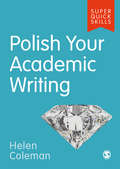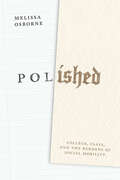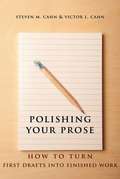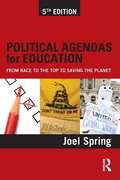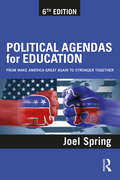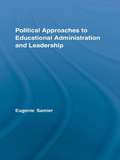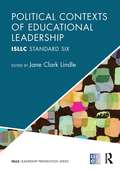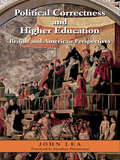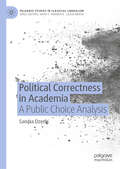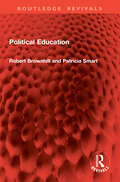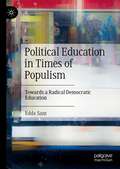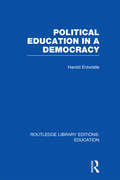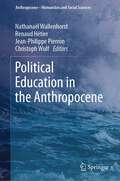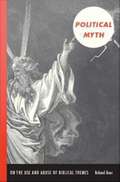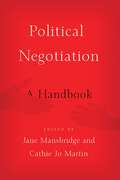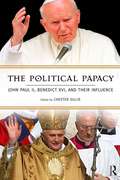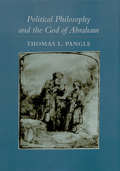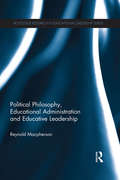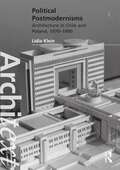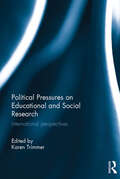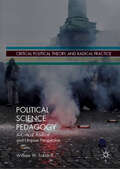- Table View
- List View
Polish Your Academic Writing (Super Quick Skills)
by Helen ColemanStruggling to find your academic voice? Polish Your Academic Writing gives you the advice and skills you need to write appropriately and impactfully and get the best grades in your assignments. Effectively make your point and answer the assigned question Build a solid and logical writing structure Perfect your paragraphs and make your sentences flow. Super Quick Skills provide the essential building blocks you need to succeed at university - fast. Packed with practical, positive advice on core academic and life skills, you’ll discover focused tips and strategies to use straight away. Whether it’s writing great essays, understanding referencing or managing your wellbeing, find out how to build good habits and progress your skills throughout your studies. Learn core skills quickly Apply right away and see results Succeed in your studies and life. Super Quick Skills give you the foundations you need to confidently navigate the ups and downs of university life.
Polish Your Academic Writing (Super Quick Skills)
by Helen ColemanStruggling to find your academic voice? Polish Your Academic Writing gives you the advice and skills you need to write appropriately and impactfully and get the best grades in your assignments. Effectively make your point and answer the assigned question Build a solid and logical writing structure Perfect your paragraphs and make your sentences flow. Super Quick Skills provide the essential building blocks you need to succeed at university - fast. Packed with practical, positive advice on core academic and life skills, you’ll discover focused tips and strategies to use straight away. Whether it’s writing great essays, understanding referencing or managing your wellbeing, find out how to build good habits and progress your skills throughout your studies. Learn core skills quickly Apply right away and see results Succeed in your studies and life. Super Quick Skills give you the foundations you need to confidently navigate the ups and downs of university life.
Polished: College, Class, and the Burdens of Social Mobility
by Melissa OsborneAn illuminating look at the emotional costs of mobility faced by first-generation and low-income college students. While college initiates a major transition in all students’ lives, low-income and first-generation students attending elite schools are often entering entirely new worlds. Amid the financial and academic challenges of adapting to college, their emotional lives, too, undergo a transformation. Surrounded by peers from different classes and cultural backgrounds, they are faced with an impossible choice: turn away from their former lives to blend in or stay true to themselves and remain on the outside. An ethnography that draws on in-depth interviews with one hundred and fifty first-generation and low-income students across eighteen elite institutions, Polished uncovers the hidden consequences of the promise of social mobility in today’s educational landscape. Sociologist Melissa Osborne reveals how the very support designed to propel first-generation students forward can unexpectedly reshape their identities, often putting them at odds with their peers and families. Without direct institutional support, this emotional journey can lead to alienation, mental health challenges, poor academic outcomes, and difficult choices between upward mobility or maintaining authenticity and community. Whether you're an educator, advocate, or student, Polished provides a powerful perspective on the uncharted challenges of social mobility and personal identity during college.
Polishing Your Prose: How to Turn First Drafts Into Finished Work
by Steven Cahn Victor CahnThis singular book illustrates how to edit a piece of prose and enhance its clarity of thought and felicity of style. The authors first present ten principles of effective composition, and then scrutinize three extended paragraphs, suggesting with remarkable specificity how to improve them. The volume also offers challenging practice questions, as well as two finished essays, one serious and one humorous, that demonstrate how attention to sound mechanics need not result in mechanical writing. Steven M. Cahn and Victor L. Cahn help readers deploy a host of corrective strategies, such as avoiding jargon, bombast, and redundancy; varying sentence structure; paring the use of adjectives and adverbs; properly deploying phrases and clauses; and refining an argument. Here is a book for all who seek to increase their facility in written communication.
Political Agendas for Education
by Joel SpringThe Fifth Edition of Joel Spring's ongoing documentation and analysis of political agendas for education reflects the major political issues in education since 2008. This edition focuses on the education sections of the 2012 Republican, Democratic, Green, and Libertarian Party platforms. Taking a fresh look at the social and political forces, educational research, and ideologies shaping the educational agendas of these political parties and a comparative approach, the book stimulates reflection and discussion. New coverage in the Fifth Edition includes: * The political coup called Race to the Top* Common Core State Standards and national testing based on the Standards* Explosion of online instruction* Debates about teacher evaluations and merit pay* Growing for-profit education industry* New agenda for American Education: Constitutional amendment; long life and happiness; environmental education Political Agendas for Education is essential reading for courses dealing with the politics of education, foundations of education, educational leadership, and curriculum studies, and for educational scholars, professionals, policymakers, and all those concerned with the politics of education in the U.S. and its consequences for schools and society.
Political Agendas for Education: From Make America Great Again to Stronger Together
by Joel SpringFollowing the epic, contentious 2016 presidential election, Joel Spring’s ongoing documentation and analysis of political agendas for education reflect the major political issues since 2012. Here he examines the 2016 education planks of the Republican, Democratic, Libertarian, and Green Parties, using their official platforms and other statements, speeches given by each candidate, and media reports and publications. Each party’s position is linked to previous political movements in education. Spring offers an alternative agenda for American schools, including a proposed education amendment to the U.S. Constitution and replacing human capital agendas with goals emphasizing education for a long life and happiness. Taking a fresh look at the social and political forces, educational research, and ideologies shaping their educational agendas and a comparative approach, the book stimulates reflection and discussion. Updates and changes in the Sixth Edition: Betsy DeVos’s education agenda supporting vouchers, free market competition and for-profit schools and its relationship to the education section of the 2016 Republican platform The important role religion and culture played in the evolution of Republican education policies after the school prayer and Bible decisions of the 1960s The influence of human capital economics on Democratic education proposals How No Child Left Behind and Democratic President Barack Obama opened doors to the growth of the for-profit education industry and investment bankers The 2016 Democratic positions on the cost of higher education and student loan debts The Democratic left as represented by the 2016 campaign of Democrat Bernie Sanders and his influence on the presidential candidate Hillary Clinton and the Democratic Party platform The education proposals of the Green and Libertarian parties
Political Approaches to Educational Administration and Leadership (Routledge Research in Education)
by Eugénie A. SamierThis collection explores the political philosophy and theory foundations for educational administration and leadership as they influence our understanding, analysis and practice in the field. The first section, "Political Philosophy: The Foundations," discusses the work of such writers as Machiavelli, Kant and Hegel, Hayek, Habermas, and Bourdieu as their theories apply to the educational context. The second section, "Political Analysis: The Critique," examines various types of political analyses, such as the politics of the policy process, minority politics, civil society, micro-politics, community politics, and cosmopolitan theory. The last section, "Current Political Controversies: The Practice," addresses current topical issues of a political nature, including the serving of the state economic agenda, the democratisation of educational organisations, the neo-conservative agenda, and globalisation. The broad international perspective from which these topics are covered makes this volume an excellent addition to the fields of educational leadership, organizational studies, and educational administration theory.
Political Contexts of Educational Leadership: ISLLC Standard Six (PSEL/NELP Leadership Preparation)
by Jane LindleCo-published with UCEA, this exciting new textbook is the first to tackle the ISLLC Standard #6—the political context of education. This unique volume helps aspiring school leaders understand the dynamics of educational policy in multiple arenas at the local, state, and federal levels. Leaders are responsible for promoting the success of every student by understanding, responding to, and influencing the political, social, economic, legal, and cultural contexts in which education and learning reside. By presenting problem-posing cases, theoretical grounding, relevant research, and implications for practice, this book provides aspiring leaders with the background, learning experiences, and analytical tools to successfully promote student success in their contexts. Special features: Case studies - provide an authentic illustration of the political dynamics that emanate from individual, social, economic, and cultural issues surrounding all schools. Suggested activities - further aspiring school leaders’ understanding of political issues through experiences Companion website – includes shared resources relevant to all ISLLC standards, along with particular activities for ISLLC Standard #6
Political Correctness and Higher Education: British and American Perspectives
by John LeaHow many times have you heard the phrase: `it’s all political correctness gone mad!’ Do you ever wonder whether colleges and universities are really awash with trivial concerns about the use of language or whether they are actually trying to address serious concerns about discrimination and harassment? Have you ever wanted to get to the bottom of what all the fuss is about? This book is the first major study of political correctness in post compulsory education to be published in the UK. For readers in the UK unfamiliar with the nature of the controversies in US college campuses this book offers a comprehensive assessment of the key themes, including who and what was behind key campaigns. For readers in the US unfamiliar with how this cultural export has faired in the UK this book looks at the significant similarities and differences in the ways that the phrase has been used in both societies. Apart from addressing the roots of political correctness the book seeks to show how the phrase has helped to complicate the traditional boundaries between those on the political Left and those on the political Right. The book also demonstrates in clear terms how the phrase is integral to understanding key themes in cultural theory, such as postmodernism and identity politics. This book is intended to be of interest to a number of readers: Teachers working in colleges and universities; Teacher educators and student teachers working on programmes of initial teacher education; Students studying undergraduate programmes in comparative politics and/or sociology and cultural studies Finally, the book will seek to capture the reflections of prominent academics and educationalists bon both sides of the Atlantic, who have worked in environments where the phrase has impinged on aspects of their work over the last twenty five years. If you think that `political correctness’ simply amounts to what jokes you are allowed to tell in a classroom, hopefully this book will challenge you to think again.
Political Correctness in Academia: A Public Choice Analysis (Palgrave Studies in Classical Liberalism)
by Sandra DzenisThis book explores the phenomenon of political correctness in academia and explains why and how scholars and administrators impact PC&’s prominence in the academic sphere. To do so, it examines the actions of these agents through the lens of public choice theory, revealing how self-interested strategies drive the policies and norms of the university. The book examines the ideological dimensions of political correctness and highlights four key spheres of influence – academic research, higher education curricula, affirmative action and speech codes. The book offers a nuanced exploration of how PC and liberalism have common ground. It demonstrates how the liberal values of equality and individual liberty largely underpin PC, whose regulatory function is to protect a liberal value system from illiberal truth claims. Yet the book also shows how interest groups form around the concept of PC in universities and have successfully used systems of rent-seeking and collective action to shape institutional policy and protect their members from ideological and professional competition, which can be seen as a violation of classical liberal principles of fair competition and equal opportunity. This book is a valuable tool for researchers working in political economy and PPE (politics, philosophy and economics), as well as those interested in the political economy of academia and the concept of PC more generally.
Political Education (Routledge Revivals)
by Patricia Smart Robert BrownhillA debate has been in existence as to whether political education—or indeed political argument of any kind—should be kept out of the classroom. There are those who argue that political education is synonymous with indoctrination and others who suggest that education is by its nature political. For those who agree that there should be a distinct political aspect of the curriculum which instils political knowledge and awareness, there is of course the question of where the emphasis should be placed. How is it possible to achieve any kind of balance? First published in 1989, Political Education analyses the debate about the introduction of courses in political education to secondary, tertiary, and adult education as well as to youth work. It also examines the introduction of an element of political education to specific subjects. It puts forward an argument for political education and discusses what it should consist of and how it should be undertaken. This book will be of interest to students and researchers of education.
Political Education in Times of Populism: Towards a Radical Democratic Education
by Edda Sant"In professional and academic contexts nothing is more important than helping people to understand and engage with democratic society. Sant has written an excellent book which helps greatly towards that end. She has developed incisive new arguments about the nature of contemporary politics and education. Using the most recent as well as classic literature, she explores key ideas and issues. Through wide ranging discussions and by referring to her own valuable empirical work she characterizes and creates thoughtful insights and innovative pedagogical approaches. This book achieves the very difficult task of illuminating complex ideas at the same time as helping to determine practical ways to achieve social justice through education. Political education has been neglected for too long. This book is a bold new step in its achievement."—Ian Davies, Emeritus Professor, University of York, UKThis book examines political education in times of democratic crisis, polarisation and uncertainty. Using populism as a diagnostic tool, the book scrutinises current democratic practices and considers alternatives for future social studies and citizenship education. The author examines contemporary events including Brexit, the Catalan referendum for independence and protests in Chile to ask how democratic educators can respond to times of crisis. Centered on themes of knowledge and ideology, the book draws together political philosophy and educational research to map out, critically analyse and offer alternatives to dominant debates on political education. It will be of interest and value to scholars examining the relationship between democracy and educational theory and practice.Edda Sant is Senior Lecturer at Manchester Metropolitan University, UK. A former social studies teacher, her research interests lie in citizenship, political and democratic education. She has published widely in this field, and in 2016 was recognized with a Children’s Identity & Citizenship European Association Award.
Political Education in a Democracy (Routledge Library Editions: Education)
by Harold EntwistleIn this volume the author analyzes the relationships of concepts such as socialization and political education, explains those aspects of the theory and practice of democracy that are especially relevant for schools, and suggests ways in which teachers can better provide for the political education of their students.
Political Education in the Anthropocene (Anthropocene – Humanities and Social Sciences)
by Christoph Wulf Nathanaël Wallenhorst Renaud Hétier Jean-Philippe PierronThis book articulates an educational theory as well as a political theory of the Anthropocene. Divided into three sections it addresses educational anthropology, cultures and institutions, and educational recommendations in the Anthropocene. Topics covered in the volume measure the impact of the idea of the Anthropocene on the type of anthropology that underlies education and on a phenomenology of relationship. It links the notion of the Anthropocene with cultures and institutions so as not to 'smooth out' or erase the latter. Finally, it presents proposals and recommendations for educational practices. The work advocates rethinking education as an essential component in ensuring the sustainability of human life in society - by proposing to go beyond the approach of education for sustainable development or environmental education. The work also brings together empirical contributions in which proposals are elaborated for programs, pedagogical devices and experiments relating to the preparation of the future in the field of education. This volume is of interest to researchers of the Anthropocene.
Political Myth: On the Use and Abuse of Biblical Themes
by Roland BoerIn this provocative and necessary work, Roland Boer, a leading biblical scholar and cultural theorist, develops a political myth for the Left: a powerful narrative to be harnessed in support of progressive policy. Boer focuses on foundational stories in the Hexateuch, the first six books of the Bible, from Genesis through Joshua. He contends that the "primal story" that runs from Creation, through the Exodus, and to the Promised Land is a complex political myth, one that has been appropriated recently by the Right to advance reactionary political agendas. To reclaim it in support of progressive political ends, Boer maintains, it is necessary to understand the dynamics of political myth. Boer elaborates a theory of political myth in dialogue with Ernst Bloch, Theodor Adorno, Alain Badiou, Jacques Lacan, and Slavoj Žižek. Through close readings of well-known biblical stories he then scrutinizes the nature of political myth in light of feminism, psychoanalysis, and Marxism. Turning to contemporary politics, he examines the statements of prominent American and Australian politicians to show how the stories of Creation, conquest, Paradise, and the Promised Land have been distorted into a fantasy of Israel as a perpetual state in the making and a land in need of protection. Boer explains how this fantasy of Israel shapes U. S. and Australian foreign and domestic policies, and he highlights the links between it and the fantasy of unfettered global capitalism. Contending that political myths have repressed dimensions which if exposed undermine the myths' authority, Boer urges the Left to expose the weakness in the Right's mythos. He suggests that the Left make clear what the world would look like were the dream of unconstrained capitalism to be realized.
Political Negotiation: A Handbook
by Cathie Jo Martin Jane MansbridgePolarization. Partisanship. Rancor. Character assassinations. Government shutdowns. Why can't our elected officials just get along and do their jobs? The United States was once seen as a land of broad consensus and pragmatic politics. Sharp ideological differences were largely absent. But today politics in America is dominated by intense party polarization and limited agreement among legislativerepresentatives on policy problems and solutions. Americans pride themselves on their community spirit, civic engagement, and dynamic society. Yet, as the editors of this volume argue, we are handicapped by our national political institutions, which often-but not always-stifle the popular desire for policyinnovation and political reforms. Negotiating Agreement in Politics explores both the domestic and foreign political arenas to understand the problems of political negotiation. The editors and contributors share lessons from success stories and offer practical advice for overcoming polarization. Indeliberative negotiation, the parties share information, link issues, and engage in joint problem solving. Only in this way can they discover and create possibilities, and use their collective intelligence for the good of citizens of both parties and for the country.
Political Papacy: John Paul II, Benedict XVI, and Their Influence
by Chester GillisPope John Paul II was famous as the most visible and politically active Pope of all time. He took his positions with great personal integrity, yet his views variously pleased and angered citizens on the right and the left. His inaugural appearance as Pope in his native Poland helped spur Solidarity and the fall of the communist bloc, yet he recently chided George W. Bush and Western world leaders for excessive capitalist policies, citing their actions as a factor in deepening world poverty. He took exception to the Liberation Theology of Central American Church leaders who viewed the philosophy as vital to the region's future well being. His positions on family, sexuality, and reproductive issues have been welcomed by many, but viewed as out of step with the reality of the times by many Church members. The book also considers Benedict XVI and his continuance of the conservative agenda set by John Paul II. This compact anthology is the first book to focus on the political legacy of Popes John Paul II and Benedict XVI. It brings together articles to present this legacy from a variety of viewpoints to give the reader a well-considered portrait of John Paul II and Benedict XVI--as men, as world citizens, and as religious leaders of a Church of one billion members who today comprise one sixth of all humanity. The final pages look to the future of the Papacy and Catholicism in the twenty-first century.
Political Philosophy and the God of Abraham
by Thomas L. PangleIn this book noted scholar Thomas L. Pangle brings back a lost and crucial dimension of political theory: the mutually illuminating encounter between skeptically rationalist political philosophy and faith-based political theology guided ultimately by the authority of the Bible. Focusing on the chapters of Genesis in which the foundation of the Bible is laid, Pangle provides an interpretive reading illuminated by the questions and concerns of the Socratic tradition and its medieval heirs in the Christian, Jewish, and Islamic worlds. He brings into contrast the rival interpretive framework set by the biblical criticism of the modern rationalists Hobbes and Spinoza, along with their heirs from Locke to Hegel. The full meaning of these diverse philosophic responses to the Bible is clarified through a dialogue with hermeneutic discussions by leading political theologians in the Judaic, Muslim, and Christian traditions, from Josephus and Augustine to our day. Profound and subtle in its argument, this book will be of interest not only to students and scholars of politics, philosophy, and religion but also to thoughtful readers in every walk of life who seek to deepen their understanding of the perplexing relationship between religious faith and philosophic reason.
Political Philosophy, Educational Administration and Educative Leadership: Political Philosophy, Educational Administration And Educative Leadership (Routledge Research in Educational Leadership)
by Reynold MacphersonIn this book Reynold Macpherson initiates a politically-critical theory of educative leadership as a fresh line of inquiry in the practice, research and theory of educational administration and educational leadership. Divided into four parts, the book introduces the sub-discipline of political philosophy to the field of educational administration, management and leadership. It does this by clarifying the knowledge domain of each and identifying how four political ideologies, specifically pragmatism, communitarianism, communicative rationalism and egalitarian liberalism, have primarily informed and surreptitiously provided contestable justifications for power in the development of practice, research and theory in the field of study. The book goes on to offer three case studies illustrating how political philosophy can be used to interpret how people become leaders and administrators of educational institutions and systems. Additional case studies then demonstrate how crises in governance in educational institutions and systems can be analyzed and improvements made using the tools of political philosophy. The final part uses the sub-discipline to critique the author’s decades of research into educative leadership, and concludes the book by both establishing the relativity of politically-critical critique and the ideology it favours; neo-pragmatism. Political Philosophy, Educational Administration and Educative Leadership will provide practitioners, researchers and theorists in educational administration, management and leadership with a deeper appreciation of power by formally introducing them to the assumptions, limits and tools of political philosophy.
Political Postmodernisms: Architecture in Chile and Poland, 1970–1990 (Architext)
by Lidia KleinPolitical Postmodernisms shows how sites outside of Western Europe and North America undermine an established narrative of architecture theory and history. It focuses specifically on postmodern architecture, which is traditionally understood as embodying the flippant and apolitical aesthetics of capitalist affluence. By investigating postmodern architecture’s manifestations in the unlikely settings of Chile during the neoliberal dictatorship of Augusto Pinochet and Poland during the late socialist Polish People’s Republic, the book argues for a new account that incorporates the political roles it plays when seen in a global perspective. Political Postmodernisms has three goals. First, it challenges the familiar narrative regarding postmodern architecture as following the “cultural logic of late capitalism” (Fredric Jameson) or as a socially conservative project (Jürgen Habermas). Second, it fills in portions of Chilean and Polish architectural history that have been neglected by Chilean and Polish architectural historians themselves. Third, Political Postmodernisms shows how architecture can work as a political form – serving propagandistic purposes and functioning as part of oppositional projects. The book is projected to be of use to students and scholars in global modern and contemporary architecture history, history of urban planning, East European Studies, and Latin American Studies.
Political Pressures on Educational and Social Research: International perspectives
by Karen TrimmerPolitical Pressures on Educational and Social Research draws upon a variety of theoretical and methodological approaches to consider the problems that can arise when research findings diverge from political directions for policy. Chapters explore the impacts this can have on the researchers, as well as the influence it has on the research, including the methodology and the publication of results. The book offers innovative ways of seeing how these connect, overlap and interact, revealing particular issues of concern for researchers and evaluators in the context of research internationally. Key topics include the power and positioning of research, evidence based policy development, ethics and the importance of research that seeks to explore and discover knowledge. The book is divided into two sections. The first presents chapters from international academics, which provide a theoretical underpinning and discussion of power, policy, ethics and their influence on research resourcing, autonomy, purpose and methodology. The second section explores specific case studies and instances from the authors’ own experiences in the field. This book offers an interesting and enlightening insight into the sometimes political nature of research and will appeal to researchers, evaluators and postgraduate students in the fields of education and the social sciences. It will be of particular interest to those studying research methods.
Political Science - Higher Secondary First Year - Tamil Nadu Board - SCERT
by Government Of Tamil NaduPolitical Science is like the skill set of a swimmer. The person with swimming skills can swim in any water body whether it is a pond or a lake or an ocean. A political science student with apt knowledge, attitude and skills can join any career of general nature.
Political Science 11th Standard - Tamilnadu Board
by Training State Council of Educational ResearchPolitical Science Textbook for the 11th Standard Students, preparing for Tamil Nadu State Board Exam.
Political Science 12th Standard - Tamilnadu Board
by Training State Council of Educational ResearchPolitical Science Textbook for the 12th Standard Students, preparing for Tamil Nadu State Board Exam.
Political Science Pedagogy: A Critical, Radical and Utopian Perspective (Critical Political Theory and Radical Practice)
by William W. SokoloffThe field of political science has not given sufficient attention to pedagogy. This book outlines why this is a problem and promotes a more reflective and self-critical form of political science pedagogy. To this end, the author examines innovative work on radical pedagogy such as critical race theory and feminist theory as well as more traditional perspectives on political science pedagogy. Bridging the divide between this research and scholarship on both teaching and learning opens the prospect of a critical, radical and utopian form of political science pedagogy. With chapters on Socrates, Frantz Fanon, Paulo Freire, Leo Strauss, Sheldon S. Wolin, e-learning, and a prison field trip, this book outlines a new path for political science pedagogy.
